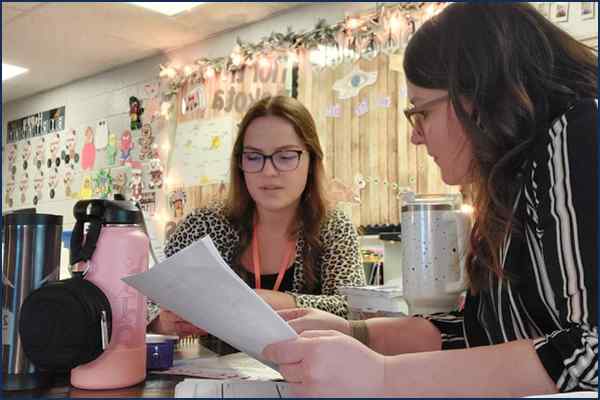One of the biggest things Dickinson State University is doing to address the statewide teacher shortage is the Para-to-Educator program, which assists current paraprofessionals in gaining their credentials to be full-time classroom teachers.
Not only does this help put more teachers in the classroom, but it also helps the retention of teachers - something Joan Oigawa Aus, Ed.D., Chair of the School of Education, says is a major factor in the shortage.
“There’s been a very small drop in the number of students who want to be teachers,” she said. “That’s not why we’re losing teachers. Where we’re losing teachers are teachers in the field. We see a lack of retention. The average teacher used to stay in the field between 10 and 15 years. Now, we’re seeing somewhere between three to five - or up to seven, depending on who you ask.”
According to the National Center for Education Statistics, eight percent of teachers leave the profession early each year.
One of the drivers influencing retention rates, Aus said, is classroom challenges and a lack of knowledge of those challenges.
“The challenges that teachers face in the classroom are unlike the challenges we had to face just 10 years ago,” she said. “Classrooms are a reflection of society. Some of our classrooms are pretty challenging.”
Having already been in the classroom, paraprofessionals are already aware of these challenges.
“It’s an additional benefit because these are not brand-new students who have no knowledge of what it’s like to teach in today’s classroom,” Aus said. “We work really closely with our community partners like Dickinson Public School and Killdeer Public School and Bowman -all of these paras are coming out of their schools, so they’re all existing paraprofessionals.”
The program has been going since 2021, but the newly-awarded state grant from the North Dakota Department of Public Instruction is bringing in more students; it’s covering 100% of their tuition, and for Dickinson Public School’s paraeducators, DPS will pay for their books.
“These grants require you to demonstrate that there’s going to be wrap-around support … for these paras. They’re not just going to finish and be cast out into their own classrooms,” Aus said. “They really want this to have a retention component.”
Since the grant was awarded, twenty-four people have applied to the program.
Also helping with retention is the sheer number of hours students in the teacher education program must spend in the classroom.
“In Teacher Ed, we’ve tried to address the retention issue by building more field experiences into our teacher prep program so that by the time one of our students becomes a teacher, they’ve already got about 120 teaching hours under their belt,” Aus said.
In 2022, DSU’s future educators also received some valuable substitute teaching experience in Dickinson Public School. Along with the faculty of the School of Education, 18 students worked with Superintendent Marcus Lewton, Ed.D., to substitute teach in the Dickinson elementary schools on Fridays so the teachers in the schools could attend professional development.
“Most of our students are encouraged to get their sub license by the time they’re a junior. And so then once all of us did it with them, many of them went on and got their independent sub license and were allowed to sub on their own when they weren’t in school,” Aus said.
The paraprofessionals in the classroom will also provide invaluable perspectives to the other students in the teacher education program.
“It’s really beneficial for our students to be able to attend classes with people that have been in the teaching field as paraprofessionals for 2, 3, 4, 10 years. Our paras run the ages from 20s all the way up to we have one applicant who’s in her early 60’s,” Aus said. “Traditional students have a tendency to go to schools with students that are aged 18 to 22 that have shared the same experiences, and these students bring a lot of different experiences to the table which are beneficial for everybody.”
The Para-to-Teacher Program allows paraprofessionals to attend classes online or in-person, which is beneficial in that it allows them to attend classes in their spare time. Since they’re in the classroom during the day, the flexibility was a must.
To learn more about the School of Education, please click here.

